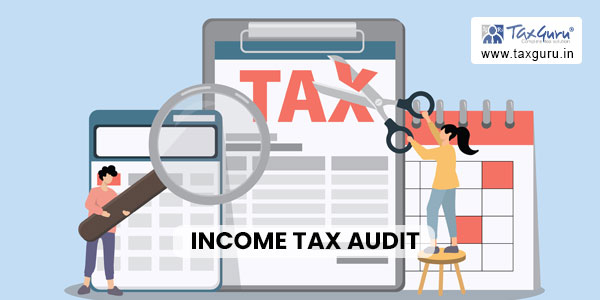Understand income tax audit in simple terms – learn about tax audit criteria, presumptive taxation schemes, penalties, and FAQs. Get clarity on when a tax audit is mandatory.
There are many types of audits conducted under various laws. Similarly, an audit conducted under the Income Tax Act, 1961 is called a ‘Tax Audit’. In the Income Tax Act, 1961, section 44AB mandates provisions for a tax audit, which are explained as follows. In the following circumstance, a tax audit will be mandatory.
| Particulars | Circumstances |
| Business (44AB(a)) | Sales, turnover, or gross receipts exceed 1 crore (If the amount received for sales, turnover, or gross receipts in cash, does not exceed 5% then the limit will be 10 crores) |
| Profession (44AB(b)) | Sales, turnover, or gross receipts exceed 50 lakh |
| Business (44AB(c)) | Claims profits and gains of the business are lower than the specified under sections 44AE, 44BB & 44BBB |
| Profession (44AB(d)) | Claims profits and gains of the profession are lower than the specified under section 44ADA |
| Business (44AB(e)) | Claims profits and gains of the profession are lower than the specified under section 44AD |
To give relief to small assessees, the Income-tax Law has incorporated a simple scheme commonly known as Presumptive Taxation Scheme, which is explained as follows.
| Section | Conditions | Income needs to be declared |
| 44AE | Business of plying, hiring, or leasing goods carriages & owns not more than ten goods carriages at any time during the previous year | An amount equal to 1000 per ton of gross vehicle weight for every month or part of the month for heavy goods vehicle & An amount equal to 7500 for every month or part of the month for other than heavy goods vehicle |
As per clause 14 of section 2 of the Motor Vehicle Act, 1988, goods carriage means any motor vehicle constructed or adapted for use solely for the carriage of goods, and As per clause 16 of section 2 of the Motor Vehicle Act, 1988, Heavy goods vehicle, means any goods carriage the gross vehicle weight of which, exceeds 12,000 kilograms

Examples
1. Ram engaged in the business of plying, hiring, or leasing goods carriages owns 9 heavy goods vehicles having a gross weight of 15,000 kilograms
| Income per month per heavy goods vehicle (15000 kilograms = 15 ton) | 15000 (15 ton * 1000 per ton) |
| (x) No of heavy goods vehicle | 9 |
| Income per month | 135000 |
| (x) No of months in the year | 12 |
| Total Income | 1620000 |
2. Ram engaged in the business of plying, hiring, or leasing goods carriages owns 9 heavy goods vehicles having a gross weight of 10,000 kilograms
| Income per month per heavy goods vehicle | 7500 |
| (x) No of heavy goods vehicle | 9 |
| Income per month | 67500 |
| (x) No of months in the year | 12 |
| Total Income | 810000 |
–
| Section | Conditions | Income needs to be declared |
| 44BB | Where a non-resident is providing services, facilities, and Supplying plant and machinery on hire, in connection with prospecting for mineral oil, or extraction or production of mineral oil. | An amount equal to 10% of the amounts received |
| 44BBB | Where a foreign company engaged in the business of civil construction or the business of erection of plant or machinery or testing or commissioning thereof, in connection with turnkey power projects | An amount equal to 10% of the amounts received |
If an assessee opts for the presumptive taxation scheme, the following circumstances are arising.
i. Not be able to claim any deduction under sections 30 to 38, Further, a partnership firm is allowed to deduct only the salary and interest paid to its partner.
ii. It is not necessary to maintain books of accounts
iii. You need to file ITR 4 before 31st July
iv. It is not necessary to get books of accounts audited
Presumptive Taxation Scheme for businesses | Section 44AD
The business has sales, turnover, or gross receipts of less than 2 crores and can opt to pay tax under this scheme. They must declare profits of 8% for non-digital transactions or 6% for digital transactions, whichever one is applicable. The following businesses are excluded from presumptive taxation:
i. Life insurance agents
ii. Commission of any kind
iii. Business of plying, hiring, or leasing goods carriages
Presumptive Taxation Scheme for professions – Section 44ADA
The profession has sales, turnover, or gross receipts of less than 50 lakhs and can opt to pay tax under this scheme. They must declare profits of 50% of sales, turnover, or gross receipts.
The penalty for non-filing or delay in filing a Tax Audit report
If any taxpayer fails to get the tax audit done is punished with the following penalty, whichever is less.
i. 0.5% of the total sales, turnover, or gross receipts
ii. Rs. 1,50,000
FAQs on tax audit
Q1. Question for businesses– If sales, turnover, or gross receipts are less than 1 crore and net profit is less than 8%/6%, then the person liable to tax audit or not?
No, the person is not liable to a tax audit, further as per section 44AB(a), if sales, turnover, or gross receipts are more than 1 crore then the person is liable to a tax audit. As per section 44AD (4) & (5), if the person opts to pay tax under the presumptive taxation scheme and suddenly opts out before the completion of 5 years for opting and as per section 44AB(e), after opting out from this scheme, the income exceeds the maximum amount which is not chargeable to income tax, then the person is liable to tax audit.
So it is confirmed that a tax audit under 1 crore sales, turnover, or gross receipts and net profit is less than 8%/6% is only applicable in the case where a person opts out from the presumptive taxation scheme before the completion of 5 years and income exceeds basic exemption limit, but if income does not exceed basic exemption limit in this case then an audit is not mandatory.
Q2. Question for professions – If sales, turnover, or gross receipts are less than 50 lakhs and net profit is less than 50%, then person liable for a tax audit or not?
No, the person is not liable to a tax audit, further as per section 44AB(b), if sales, turnover, or gross receipts are more than 50 lakhs then the person is liable to a tax audit. As per section 44AD (4) & (5), if the person opts to pay tax under the presumptive taxation scheme and suddenly opts out before the completion of 5 years for opting and as per section 44AB(b) after opts out from this scheme, the income exceeds the maximum amount which is not chargeable to income tax, then the person is liable to tax audit.
So it is confirmed that a tax audit under 50 lakhs sales, turnover or gross receipts and net profit is less than 50% is only applicable in the case where a person opts out from the presumptive taxation scheme before the completion of 5 years and income exceeds basic exemption limit, but if income does not exceed basic exemption limit in this case then an audit is not mandatory





